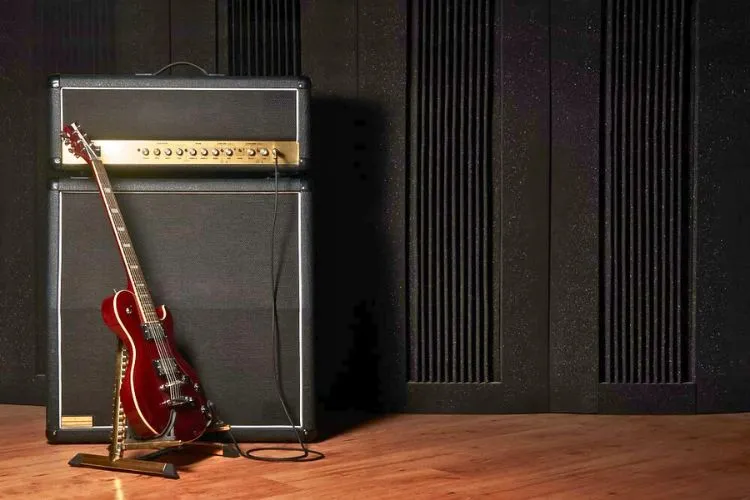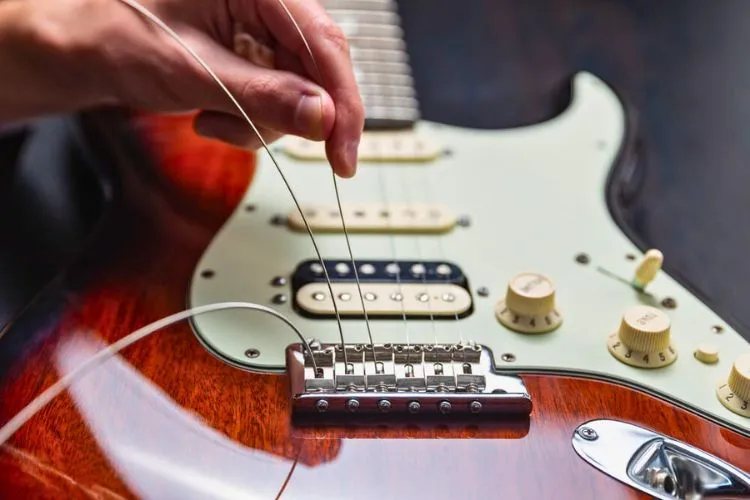Many guitar players grapple with a mystifying phenomenon: their guitars buzz or hum when the strings aren’t being touched. This extraneous noise can create a less than harmonious backdrop for your music, even posing a challenge to professionals.

In this article, we delve into this peculiar issue, exploring the causes and presenting useful solutions. Whether you’re a seasoned musician or a beginner, our guide aims to help troubleshoot guitar buzz when not touching strings and ensure a clear, clean sound for your guitar-playing future.
Contents
🎶Guitar buzz when not touching strings
Guitar buzz when not touching the strings is an issue that plagues many guitarists. This unwanted noise can happen with both electric and acoustic guitars, but it’s more noticeable with electric guitars due to amplification.
Though the buzzing or humming does not affect the notes you play, it can interfere with the clean and pure sound you aim to produce, consequently affecting the overall quality of your music.
Causes
The root cause for your guitar buzzing can range from simple issues like incorrect settings, to more specific hardware problems related to grounding.
- Incorrect Grounding: In most cases, guitar buzz or hum is caused by a grounding issue. All the electronic components of an electric guitar (the pickups, controls, and output jack) are grounded to reduce noise. If not done correctly, or if there’s a break in the grounding path somewhere, you’ll experience a buzz or hum.
- Poor Quality Cables or Equipment: Your guitar buzzing during idle may not be due to the guitar itself at all, but your cables and other equipment. Poor-quality or broken cables can create a lot of noise.
- Interference from Appliances: Electronic devices and appliances can create an electromagnetic field around them. When your guitar is in close proximity, especially one with single-coil pickups like a Stratocaster, it may pick up these signals and produce a buzzing sound.
- Humidity and Weather Conditions: Strangely, even the weather might be contributing to the noise. High humidity or extremely dry conditions can influence the wood in your guitar, causing unwanted buzzing noises.
Solutions
Addressing this issue can be as simple as adjusting some settings or as complex as modifying your guitar.
- Check your grounding: Have a professional inspect your guitar and troubleshoot for any possible grounding issues.
- Invest in Quality Cables: If you suspect your cables might be causing the issue, consider upgrading them.
- Keep Away from Interference: Try moving away from any potential sources of interference like appliances, computers, or lights, and see if the noise reduces.
- Proper Storage and Care of Your Guitar: Protect your guitar from extreme weather conditions. This includes not leaving it in the car on a hot sunny day or next to a vent blowing hot, dry air.
Investigating and remedying guitar buzz can be a process of elimination. Start with simple solutions before moving on to more complex troubleshooting. Always consider seeking professional help if you’re unsure. Proper maintenance and adjustments can ensure your guitar gives the best performance without any unwanted noise.
🎶Electric Guitar Buzzing When Touching Strings
Buzzing on an electric guitar when strings are touched usually indicates a grounding issue. When strings are touched, you are providing a path to ground the noise, so a persisting buzz hints at a problem in this circuit.

The guitar’s bridge should be grounded to the output jack, which is then grounded via the amp and finally to your home’s electrical ground. If any part of this chain is broken or flawed, a buzz might occur when you touch the strings. Consider having your electric guitar checked by a professional technician if you’re unable to locate the problem yourself.
🎶Acoustic Guitar Buzz When Touching Strings
In an acoustic guitar, the buzzing sound when touching strings could be due to a variety of reasons:
- Worn Out Frets: If frets are worn out, they can cause buzzing as they may no longer be at the correct height to allow the strings to vibrate freely.
- High or Loose Strings: High strings can buzz against the fretboard, while loose strings can vibrate and create a buzzing sound.
- Improper Action: The action, i.e., the height of the strings from the fretboard, when adjusted incorrectly, can result in buzz.
In each of these cases, a professional luthier can assess and fix the problem.
🎶Bass Guitar Buzzing When Not Touching Strings
Buzzing in a bass guitar when not touching the strings is typically an electrical issue. Just like the electric guitar, improper grounding is a common cause. However, the bass’s low-frequency pitches tend to make the buzz even more noticeable.

Other possible causes include:
- Pickup Interference: Single-coil pickups are notorious for being susceptible to interference. This can possibly be resolved by switching to a humbucker, or dual-coil pickup, which is designed to negate buzz.
- Cable or Amp Problems: Test your instrument with different cables or amps to see if the buzz persists. If it disappears, the issue lies with the equipment and not with your guitar.
Understanding the science of your guitar buzz can be messy but identifying the problem is half the battle. Enlisting the help of a professional can save your nerves and your guitar, ensuring the smooth, crisp sound that every musician craves.
Another common problem with guitar: How often do Guitar Strings Break?
Conclusion:
The problem of guitar buzz when not touching strings, can be a puzzle for musicians to solve. While it’s often grounded in electrical issues, every guitar holds unique possibilities: from equipment quality to environmental influences. This guide aimed to help identify and rectify these issues for a cleaner, more precise sound.
Start with simple fixes, but don’t hesitate to bring in professional help, ensuring your guitar can always deliver the performance you desire – devoid of any troublesome buzz. Always remember, troubleshooting is part of the guitar playing journey, and every artist has their share of it.
